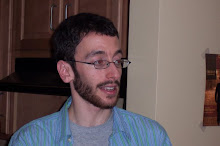 As a lover of text and language, one of the biggest challenges I face is finding the physical, visual, symbolic and metaphorical elements that provide the audience with that much needed "WOW factor" on stage. The words alone given truthful life spoken crisply and with exquisite and focused intention and timing may be wonderful as is. But audiences tend to want more. Which is fair. It's about using all of the theatrical elements available to tell the story in a unified way. It's about staging the action, not just the words; if it were the latter, having actors sit across from each other and speak might actually be enough. And, as we all can recognize, it is not.
As a lover of text and language, one of the biggest challenges I face is finding the physical, visual, symbolic and metaphorical elements that provide the audience with that much needed "WOW factor" on stage. The words alone given truthful life spoken crisply and with exquisite and focused intention and timing may be wonderful as is. But audiences tend to want more. Which is fair. It's about using all of the theatrical elements available to tell the story in a unified way. It's about staging the action, not just the words; if it were the latter, having actors sit across from each other and speak might actually be enough. And, as we all can recognize, it is not.On the flip side, it is just as easy to spot those directors who, for whatever reason, do not really trust the language of the play (and I would bet that they are not even really aware of it, at least not in those terms). They tend to make choices with regard to lights, sound, movement, and so on that, instead of providing a deeper understanding of the play, they rather act as a distraction from the text and the play as a whole, and provide the audience with a choice: either listen to the words cluttered by the "noise" and try to decipher the actor's intent, or pay attention to the "noise" and risk missing the truth and flair of the word itself, which is really carrying the message of the play.
The ideal, of course, is to find the stunning, inventive, and unique effect, appropriate to the style of the play, that blends together with the words themselves to create a singular entity: that of THE PLAY. This is in some ways a strong litmus test for a production - do you separate the words from what you see and hear around them, are do they strike you as one singular event that is being experienced in real time?
One must take great care to treat the text with respect and careful craftsmanship when giving them life on stage - after all, one must consider the craftsmanship that it took to put them on the page in the first place. So, when one lays a lengthy sound cue over a monologue, in an attempt to "illuminate" the monologue but in reality effectively drawing attention away from a beautifully written passage, such a director is doing a disservice to the play, the playwright, the production, and to his or herself.
 An example of it done right is the use of trapeze work in the RSC's Henry V a few years back. The French were in long flowing garments and suspended in air, doing acrobatic work, flips and twists, while the English, covered in dirt and dressed in muted colors, popped in and out of trap doors in the stage below.
An example of it done right is the use of trapeze work in the RSC's Henry V a few years back. The French were in long flowing garments and suspended in air, doing acrobatic work, flips and twists, while the English, covered in dirt and dressed in muted colors, popped in and out of trap doors in the stage below.It was breathtaking. Why? Because its a war, with a dichotomy to be drawn between the two nations at war. The text reveals this dichotomy, but it must then be given physical reality. The use of trapeze and differing clothing styles truly illuminated a key feature of the story itself - the DICHOTOMY, the two different sides at war. And thus, a stunning visual and physical choice was made that stayed true to the story and the text.
Paul Moser, former chair of theatre at Oberlin College and my adviser at school, spoke often about a director needing a finely tuned "bullshit-meter." That is to say, the director may really like an idea, but if it is not working on stage, they must be honest with themselves and adjust, rather than sacrifice the whole play on an idea that didn't pan out. The idea may make sense on paper - it does not mean it will work.
I have no problem with using trapeze, live music, puppetry, shadow-work, modern dance as a device within a straight play in order to provide insight into the text being spoken simultaneously. Just make sure that the two elements actually work together, rather than detract from each other. And as a director, it is OUR responsibility to make sure that they are working together instead of independently - a united artistic expression for the audience to see, hear, and experience. If the sound makes us miss the story being told, take the sound out and craft the storytelling itself. If the audience is watching the dance and not listening to the actor speaking directly to them, something may need some tweaking.
Don't cover the words up. Activate them. The writer wrote them so that they could be brought to life and have effect. Don't rob them of that capability.
"Suit the action to the word, the word to the action" - They exist to support each other; otherwise, the whole play loses its balance.


No comments:
Post a Comment